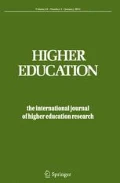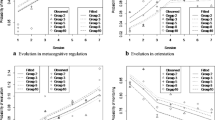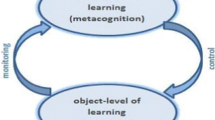Abstract
Although successful learning in university education can be advanced by students’ competence to self-regulate their learning, students often possess insufficient metacognitive regulation skills to regulate their learning adequately. The present study investigates changes in university students’ adoption of metacognitive regulation after participating in reciprocal peer tutoring (RPT). A quasi-experimental pretest–posttest design was adopted, involving an experimental (n = 51) and two control groups; CG1 (n = 24) and CG2 (n = 22). Experimental students participated in a RPT intervention during a complete semester. Metacognitive regulation was assessed by means of think-aloud protocol analysis. Results indicate that RPT is promising to promote metacognitive regulation. Experimental students increasingly adopt monitoring, evaluation, and orientation and significantly evolve towards deep-level regulation from pretest to posttest. Except for an increased use of low-level comprehension monitoring, none of the evolutions in experimental students’ regulation could be discerned for students in both control groups.
Similar content being viewed by others
Notes
Although all 64 RPT students participated in the pretest, not all of them attended the posttest assessment. Additionally, the tape recordings of some RPT students demonstrated technical problems. Therefore, the data of 13 EG students were excluded from the analysis.
Metacognitive regulation strategies with very low frequency of occurrence (<1 % in Table 2) were removed from further analyses.
References
Brown, A. L. (1987). Metacognition, executive control, self-regulation and other more mysterious mechanisms. In F. E. Weinert & R. H. Kluwe (Eds.), Metacognition, motivation and understanding (pp. 65–116). Hillsdale: Laurence Erlbaum Associates.
Cheng, Y. C., & Ku, H. Y. (2009). An investigation of the effects of reciprocal peer tutoring. Computers in Human Behavior, 25, 40–49.
Chi, M., Siler, S., Jeong, H., Yamauchi, T., & Hausmann, R. (2001). Learning from human tutoring. Cognitive Science, 25, 471–533.
De Backer, L., Van Keer, H., & Valcke, M. (2012). Exploring the potential impact of reciprocal peer tutoring on higher education students' metacognitive knowledge and regulation. Instructional Science, 40, 559–588.
Chin, C., & Brown, D. (2000). Learning in Science: A comparison of deep and surface approaches. Journal of Research in Science Teaching, 37, 109–138.
Duran, D., & Monereo, C. (2005). Styles and sequences of collaborative learning in fixed and reciprocal peer tutoring. Learning and Instruction, 15, 179–199.
Falchikov, N. (2001). Learning together. Peer tutoring in higher education. London: Routledge Falmer.
Greene, J. A., & Azevedo, R. (2009). A macro-level analysis of SRL processes and their relations to the acquisition of sophisticated mental models. Contemporary Educational Psychology, 34, 18–29.
Greene, J. A., Robertson, J., & Croker Costa, L. A. (2011). Assessing self-regulated learning using think-aloud methods. In B. J. Zimmerman & D. H. Schunk (Eds.), Handbook of self-regulation of learning and performance (pp. 313–328). New York: Routledge.
King, A. (1997). Ask to think-tell why©: A model to transactive peer tutoring for scaffolding higher level complex learning. Educational Psychologist, 32, 221–235.
Meijer, J., Veenman, M. V. J., & van Hout-Wolters, B. H. A. M. (2006). Metacognitive activities in text-studying and problem-solving: Development of a taxonomy. Educational Research and Evaluation, 12, 209–237.
Moos, D. C., & Azevedo, R. (2009). Self-efficacy and prior domain knowledge: To what extent does monitoring mediate their relationship with hypermedia learning? Metacognition and Learning, 4, 197–216.
Nota, L., Soresi, S., & Zimmerman, B. J. (2004). Self-regulation and academic achievement: A longitudinal study. International Journal of Educational Research, 41, 198–215.
Perry, N. E., & Winne, P. H. (2013). Tracing students’ regulation of learning in complex collaborative tasks. In S. Volet & M. Vauras (Eds.), Interpersonal regulation of learning and motivation: Methodological advances (pp. 45–66). London: Routledge.
Pintrich, P. R. (2004). A conceptual framework for assessing motivation and self-regulated learning in college students. Educational Psychology Review, 16, 385–407.
Roscoe, R. D., & Chi, M. (2008). Tutor learning: The role of explaining and responding to questions. Instructional Science, 36, 321–350.
Schunk, D. H., & Zimmerman, B. J. (2007). Influencing children’s self-efficacy and self-regulation of reading and writing through modelling. Reading and Writing Quarterly, 23, 7–25.
Topping, K. J. (1996). Effective peer tutoring in further and higher education: A typology and review of the literature. Higher Education, 32, 321–345.
Veenman, M. V. J., Elshout, J. J., & Meijer, J. (1997). The generality vs. domain-specificity of metacognitive skills in novice learning across domains. Learning and Instruction, 7, 187–209.
Veenman, M. V. J., Kok, R., & Blöte, A. W. (2005). The relation between intellectual and metacognitive skills in early adolescence. Instructional Science, 33, 193–211.
Volet, S., Vauras, M., & Salonen, P. (2009). Self- and social regulation in learning contexts: An integrative perspective. Educational Psychologist, 44, 215–226.
Winne, P. H., & Hadwin, A. F. (1998). Studying as self-regulated learning. In D. J. Hacker, J. Dunlosky, & A. C. Graesser (Eds.), Metacognition in educational theory and practice (pp. 279–306). Hilsdale: Erlbaum.
Zimmerman & Schunk. (2011). Self-regulated learning and performance: An introduction and an overview. In B. J. Zimmerman & D. H. Schunk (Eds.), Handbook of self-regulation of learning and performance (pp. 1–12). New York: Routledge.
Author information
Authors and Affiliations
Corresponding author
Rights and permissions
About this article
Cite this article
De Backer, L., Van Keer, H. & Valcke, M. Promoting university students’ metacognitive regulation through peer learning: the potential of reciprocal peer tutoring. High Educ 70, 469–486 (2015). https://doi.org/10.1007/s10734-014-9849-3
Published:
Issue Date:
DOI: https://doi.org/10.1007/s10734-014-9849-3




